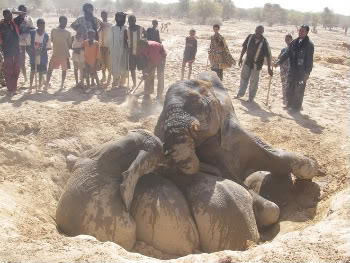|
|
The worst drought in 26 years is threatening a rare herd of desert elephants in the West African country of Mail, warns the conservation organization Save the Elephants. The herd of 350-450 desert elephants live in the Gourma district of Mali, which lies in the Sahel belt that separates the Saharan desert from the Sudan.
The elephants have been observed trekking farther than usual to find sources of water. Save the Elephants warns that juvenile elephants are most in danger, since more mature elephants with longer trunks can reach water even in deep wells.
“The elephants are now in a deadly situation as they wait for the rains to begin. Six elephants have died in the last couple of months from causes related to the drought conditions,” says Save the Elephants’ scientist Jake Wall.
 Four elephants trapped in a mud hole into which they tumbled when seeking for water. They were pulled out by the Save the Elephants team with the help of local people who joined in the effort to save them. Only one survived. Photo courtesy of: Save the Elephants. |
Having monitored this herd of elephants since the 1970s, Dr. Iain Douglas-Hamilton, also of Save the Elephants, points out that the desert elephants’ “range has shrunk drastically since the 1970’s due to climate change and overstocking of livestock which has degraded the habitat. These elephants have the longest migration route of any in Africa and move in a counterclockwise circle of about 700km. At the height of the dry season there are only a handful of shallow lakes left to them until recharged by rains in July and August.”
The drought is hurting more than elephants, according to Wall. “The situation is equally dire for the Touareg and Pheul herdsmen who rely on Banzena for their cattle and many cows are now dying each day from lack of water and the soaring temperatures which reach 50 degrees Celsius in the shade,” he explains. “The stench of rotting corpses fills the air and what little water remains is putrid and undrinkable by all standards. The normal peaceful coexistence between the elephants and herdsmen is starting to break-down and giving way to conflict over access to water.”
Save the Elephants, in partnership with the WILD Foundation and the Mali government, is planning to secure water for the elephants to protect the herd before the rains return, as they usually do in June. However, funds for the project are lacking and the organization is unsure of the water quality.
Related articles
Huge cache of smuggled ivory represents up to 40 elephants
(04/29/2009) On April 25th two men were pursued by wildlife rangers from the Amboseli-Tsavo Game Scouts Association in Tanzania. The men escaped across the border to southern Kenya where they were caught by police, who had been tipped off by the wildlife scouts. The two men’s SUV contained 1,550 lbs (703 kilograms) of elephant tusks, representing a total of up to forty individuals according to the Kenyan Wildlife Service. This is considered the largest seizure in the region since the ivory smuggling boom of the late 1970s and early 1980s. The ivory is estimated at a value of $750,000 (or 60 million Kenyan shillings).
Vanishing forest elephants are the Congo’s greatest cultivators
(04/09/2009) A new study finds that forest elephants may be responsible for planting more trees in the Congo than any other species or ghenus. Conducting a thorough survey of seed dispersal by forest elephants, Dr. Stephen Blake, formerly of the Wildlife Conservation Society (WCS) and now of the Mac Planck Institute for Ornithology, and his team found that forest elephants consume more than 96 species of plant seeds and can carry the seeds as far as 57 kilometers (35 miles) from their parent tree. Forest elephants are a subspecies of the more-widely known African elephant of the continent’s great savannas, differing in many ways from their savanna-relations, including in their diet.
Chad’s elephant population falls by two-thirds in two years
(12/11/2008) Civil strife of Chad, a consequence of the calamity in Darfur, is taking a toll on the country’s elephant population, reports the Wildlife Conservation Society (WCS) which has launched an emergency appeal for funds to support conservation efforts in the country.